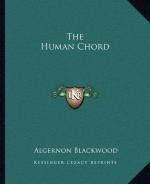“You believe in a God?”
“A Supreme Intelligence, most certainly,” was the emphatic reply.
“And spirits?”
Spinrobin hesitated. He was a very honest soul.
“Other life, let me put it,” the clergyman helped him; “other beings besides ourselves?”
“I have often felt—wondered, rather,” he answered carefully, “whether there might not be other systems of evolution besides humanity. Such extraordinary Forces come blundering into one’s life sometimes, and one can’t help wondering where they come from. I have never formulated any definite beliefs, however—”
“Your world is not a blind chaos, I mean?” Mr. Skale put gravely to him, as though questioning a child.
“No, no, indeed. There’s order and system—”
“In which you personally count for something of value?” asked the other quickly.
“I like to think so,” was the apologetic reply. “There’s something that includes me somewhere in a purpose of very great importance—only, of course, I’ve got to do my part, and—”
“Good,” Mr. Skale interrupted him. “And now,” he asked softly, after a moment’s pause, leaning forward, “what about death? Are you afraid of death?”
Spinrobin started visibly. He began to wonder where this extraordinary catechism was going to lead. But he answered at once: he had thought out these things and knew where he stood.
“Only of its possible pain,” he said, smiling into the bearded visage before him. “And an immense curiosity, of course—”
“It does not mean extinction for you—going out like the flame of a candle, for instance?”
“I have never been able to believe that, Mr. Skale. I continue somewhere and somehow—forever.”
The cross-examination puzzled him more and more, and through it, for the first time, he began to feel dimly, ran a certain strain of something not quite right, not permissible in the biggest sense. It was not the questions themselves that produced this odd and rather disquieting impression, but the fact that Mr. Skale was preparing the ground with such extraordinary thoroughness. This conversation was the first swell, as it were, rolling mysteriously in upon him from the ocean in whose deeps the great Experiment lay buried. Forces, tidal in strength, oceanic in volume, shrouded it just now, but he already felt them. They reached him through the person of the clergyman. It was these forces playing through his personality that Spinrobin had been aware of the first moment they met on the station platform, and had “sensed” even more strongly during the walk home across the mountains.
Behind the play of these darker impressions, as yet only vague and ambiguous, there ran in and out among his thoughts the vein of something much sweeter. Miriam, with her large grey eyes and silvery voice, was continually peeping in upon his mind. He wondered where she was and what she was doing in the big, lonely house. He wished she could have been in the room to hear his answers and approve them. He felt incomplete without her. Already he thought of her as the melody to which he was the accompaniment, two things that ought not to be separated.




